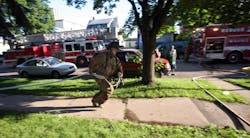I have a very high energy eight-year-old that studies and practices martial arts. Recently he was preparing himself for his next belt examination and was having trouble with a few the techniques. In an effort to help him through these problems I set him up with a couple of private lessons for one-on-one help.
I sat and observed one of these lessons and listened closely as the instructor worked with him. Each time this young man would do the technique improperly the frustration would grow. Finally the instructor asked him why he was messing up so bad, and with reluctance he said "because I'm going so fast." That was the right answer. Next it was explained that if you want to do better, you must slow down and practice.
I listened more and more and the simplest of things occurred to me. This very simple principal of slowing down when you practice should be applied to the skills of firefighting. I would challenge you to stop and think about your last company drill. Did you, as an individual really spend time with the material or did you hurry up quick get it done? Did you examine the way you preformed the skill and look for problem areas? Did you use it as an opportunity to improve yourself?
Face it, the basic skills involved in firefighting really haven't changed in years. I know doing the same drills over and over is tedious and boring. We have challenged departments to keep it new and keep people interested. Now it is time for the individual to commit to making the best of our training and improving our performance.
Slowing down when you drill will foster better practices. This is true for firefighters and officers alike. Look at the objective for the drill and ask yourself what is my role? Think about each task you must perform, play it out in your head then do the task. Next, ask yourself did I do my best or how can I improve? Break your training apart before you run the drill and practice each task step by step. This could be any task, donning your SCBA, throwing ladders, setting your engine up for operation any task you may use.
For years the fire service has had a nasty habit of rushing. In our entry level firefighter training we force people to do many tasks under a time constraint. For example you have one minute to put on your turnout gear, another minute to don the SCBA. If we drill, teach and train in this fashion we create an environment of rushing. When people rush they make mistakes which in our business can be very costly. I understand that time is important when there is a fire or other types of incident. Take the extra seconds or minutes to be sure skills are done right, safe and efficient. Walk, don't run. When you run you increase the risk of accident and injury.
Remember practice often (1,000 times is not enough), slow it down, learn from mistakes, and most of all be safe.






